Report: Sustainable Practices in Indian Automotive Sector Analysis
VerifiedAdded on 2023/01/12
|12
|2596
|45
Report
AI Summary
This report provides a comprehensive review of sustainable practices within the Indian automotive sector. The research employs a detailed methodology, beginning with the Research Onion to systematically address the research question: identifying and ranking green practices applicable in the Indian automotive sector. The study utilizes an Interpretivism paradigm and an inductive approach, combining primary data collection through semi-structured interviews with professionals in the automotive sector and secondary data from literature reviews. The research explores the implementation of green supply chain management, its challenges, and opportunities. Data analysis is conducted using thematic analysis to interpret qualitative data. The report also addresses ethical considerations, ensuring data originality and respondent confidentiality. The findings offer insights into the current state of sustainability in the Indian automotive industry.
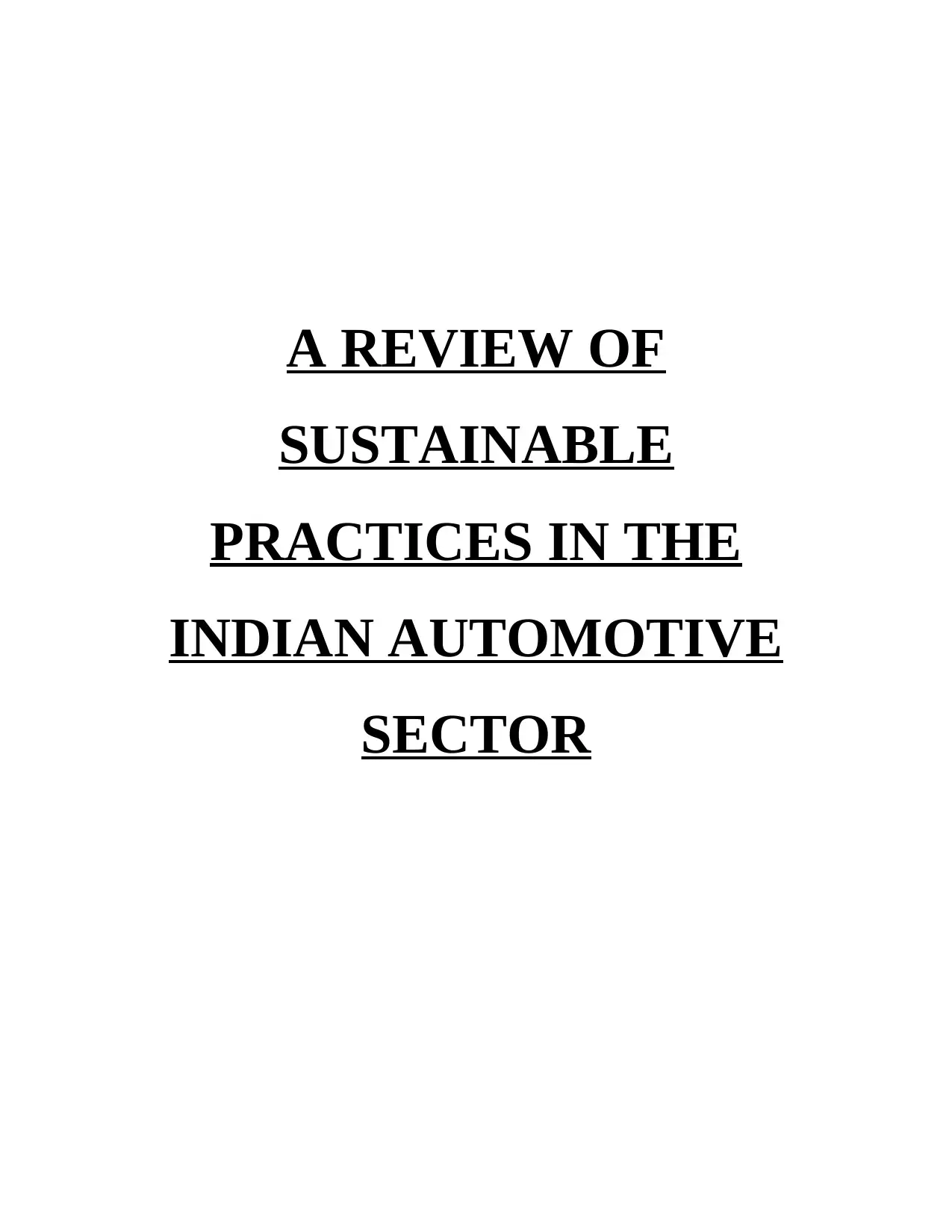
A REVIEW OF
SUSTAINABLE
PRACTICES IN THE
INDIAN AUTOMOTIVE
SECTOR
SUSTAINABLE
PRACTICES IN THE
INDIAN AUTOMOTIVE
SECTOR
Paraphrase This Document
Need a fresh take? Get an instant paraphrase of this document with our AI Paraphraser
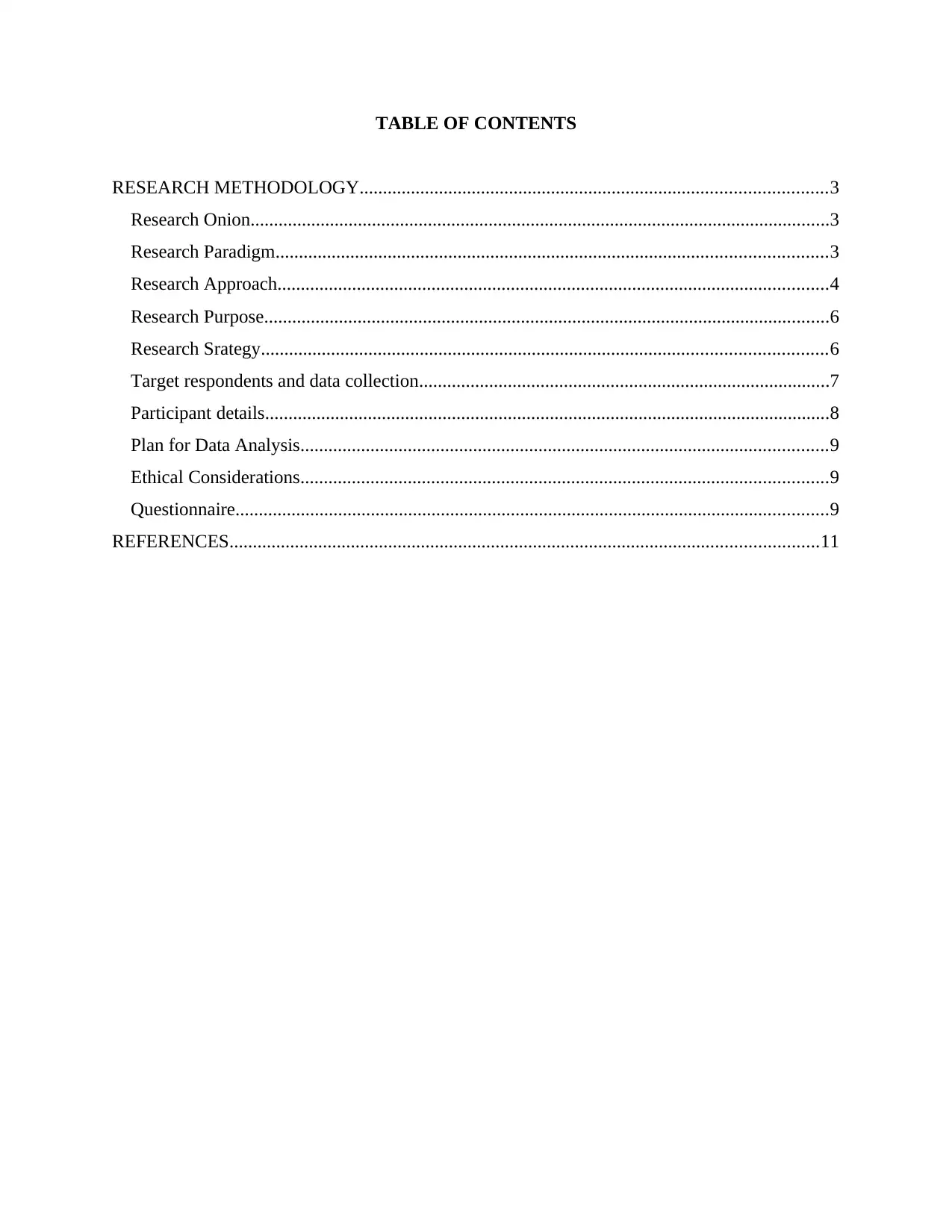
TABLE OF CONTENTS
RESEARCH METHODOLOGY....................................................................................................3
Research Onion............................................................................................................................3
Research Paradigm......................................................................................................................3
Research Approach......................................................................................................................4
Research Purpose.........................................................................................................................6
Research Srategy.........................................................................................................................6
Target respondents and data collection........................................................................................7
Participant details.........................................................................................................................8
Plan for Data Analysis.................................................................................................................9
Ethical Considerations.................................................................................................................9
Questionnaire...............................................................................................................................9
REFERENCES..............................................................................................................................11
RESEARCH METHODOLOGY....................................................................................................3
Research Onion............................................................................................................................3
Research Paradigm......................................................................................................................3
Research Approach......................................................................................................................4
Research Purpose.........................................................................................................................6
Research Srategy.........................................................................................................................6
Target respondents and data collection........................................................................................7
Participant details.........................................................................................................................8
Plan for Data Analysis.................................................................................................................9
Ethical Considerations.................................................................................................................9
Questionnaire...............................................................................................................................9
REFERENCES..............................................................................................................................11
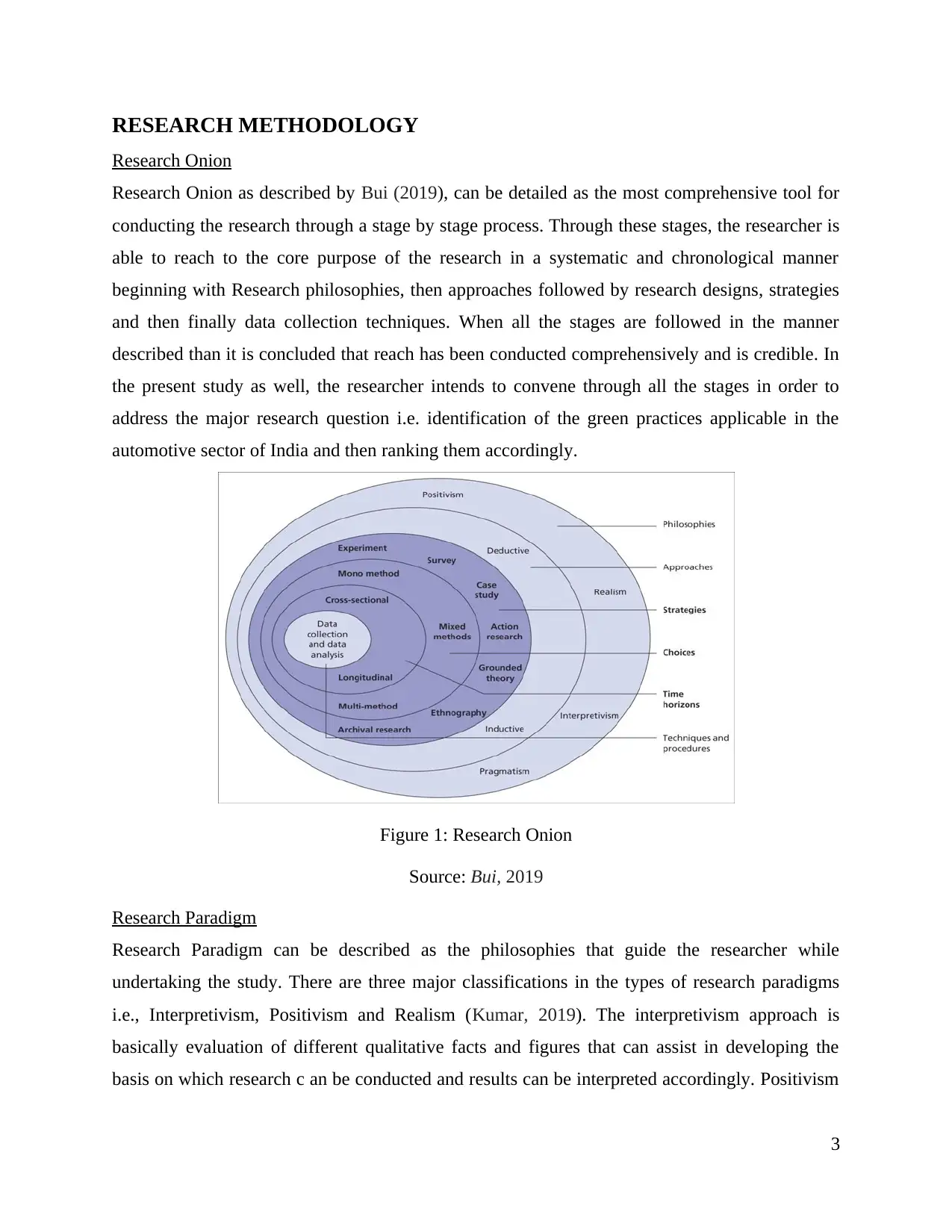
RESEARCH METHODOLOGY
Research Onion
Research Onion as described by Bui (2019), can be detailed as the most comprehensive tool for
conducting the research through a stage by stage process. Through these stages, the researcher is
able to reach to the core purpose of the research in a systematic and chronological manner
beginning with Research philosophies, then approaches followed by research designs, strategies
and then finally data collection techniques. When all the stages are followed in the manner
described than it is concluded that reach has been conducted comprehensively and is credible. In
the present study as well, the researcher intends to convene through all the stages in order to
address the major research question i.e. identification of the green practices applicable in the
automotive sector of India and then ranking them accordingly.
Figure 1: Research Onion
Source: Bui, 2019
Research Paradigm
Research Paradigm can be described as the philosophies that guide the researcher while
undertaking the study. There are three major classifications in the types of research paradigms
i.e., Interpretivism, Positivism and Realism (Kumar, 2019). The interpretivism approach is
basically evaluation of different qualitative facts and figures that can assist in developing the
basis on which research c an be conducted and results can be interpreted accordingly. Positivism
3
Research Onion
Research Onion as described by Bui (2019), can be detailed as the most comprehensive tool for
conducting the research through a stage by stage process. Through these stages, the researcher is
able to reach to the core purpose of the research in a systematic and chronological manner
beginning with Research philosophies, then approaches followed by research designs, strategies
and then finally data collection techniques. When all the stages are followed in the manner
described than it is concluded that reach has been conducted comprehensively and is credible. In
the present study as well, the researcher intends to convene through all the stages in order to
address the major research question i.e. identification of the green practices applicable in the
automotive sector of India and then ranking them accordingly.
Figure 1: Research Onion
Source: Bui, 2019
Research Paradigm
Research Paradigm can be described as the philosophies that guide the researcher while
undertaking the study. There are three major classifications in the types of research paradigms
i.e., Interpretivism, Positivism and Realism (Kumar, 2019). The interpretivism approach is
basically evaluation of different qualitative facts and figures that can assist in developing the
basis on which research c an be conducted and results can be interpreted accordingly. Positivism
3
⊘ This is a preview!⊘
Do you want full access?
Subscribe today to unlock all pages.

Trusted by 1+ million students worldwide
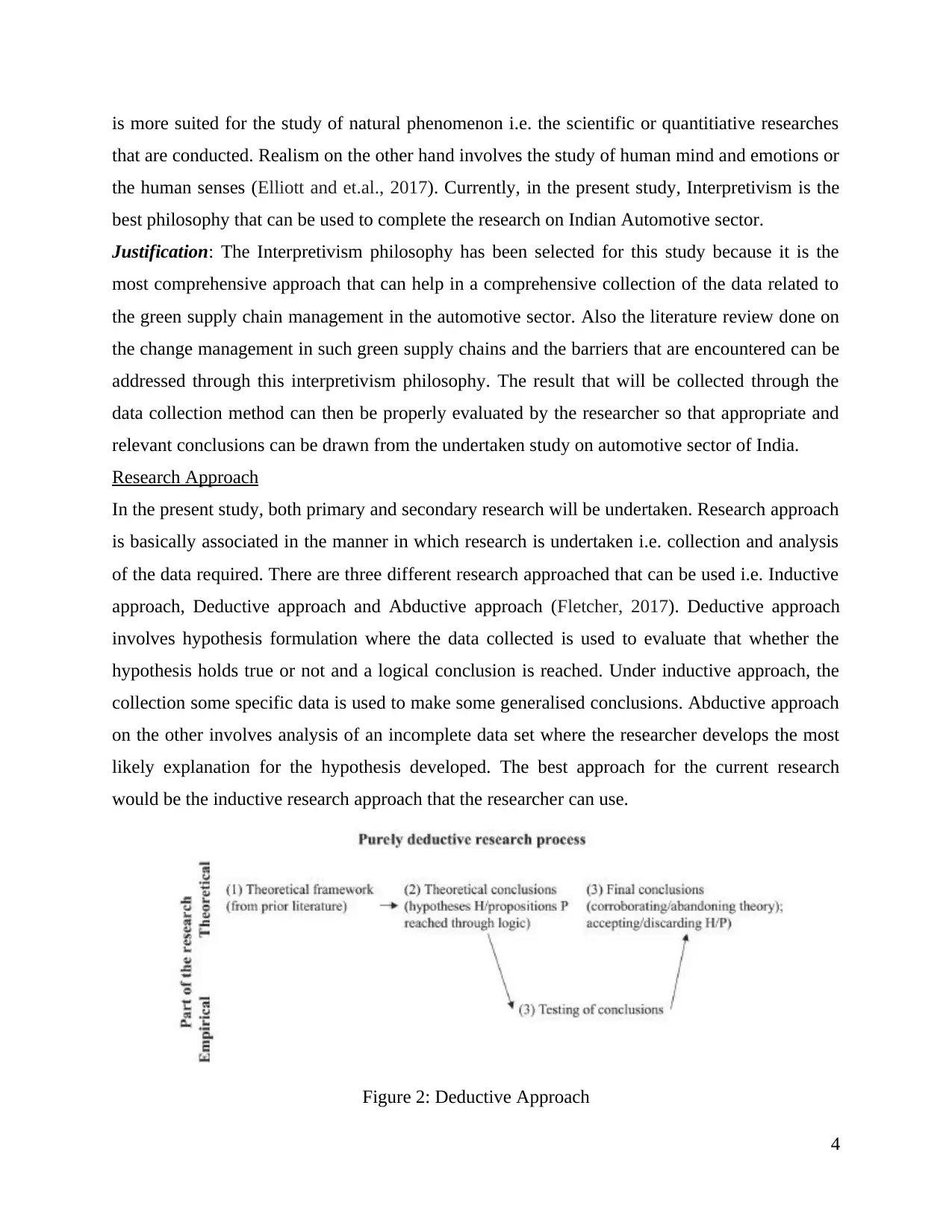
is more suited for the study of natural phenomenon i.e. the scientific or quantitiative researches
that are conducted. Realism on the other hand involves the study of human mind and emotions or
the human senses (Elliott and et.al., 2017). Currently, in the present study, Interpretivism is the
best philosophy that can be used to complete the research on Indian Automotive sector.
Justification: The Interpretivism philosophy has been selected for this study because it is the
most comprehensive approach that can help in a comprehensive collection of the data related to
the green supply chain management in the automotive sector. Also the literature review done on
the change management in such green supply chains and the barriers that are encountered can be
addressed through this interpretivism philosophy. The result that will be collected through the
data collection method can then be properly evaluated by the researcher so that appropriate and
relevant conclusions can be drawn from the undertaken study on automotive sector of India.
Research Approach
In the present study, both primary and secondary research will be undertaken. Research approach
is basically associated in the manner in which research is undertaken i.e. collection and analysis
of the data required. There are three different research approached that can be used i.e. Inductive
approach, Deductive approach and Abductive approach (Fletcher, 2017). Deductive approach
involves hypothesis formulation where the data collected is used to evaluate that whether the
hypothesis holds true or not and a logical conclusion is reached. Under inductive approach, the
collection some specific data is used to make some generalised conclusions. Abductive approach
on the other involves analysis of an incomplete data set where the researcher develops the most
likely explanation for the hypothesis developed. The best approach for the current research
would be the inductive research approach that the researcher can use.
Figure 2: Deductive Approach
4
that are conducted. Realism on the other hand involves the study of human mind and emotions or
the human senses (Elliott and et.al., 2017). Currently, in the present study, Interpretivism is the
best philosophy that can be used to complete the research on Indian Automotive sector.
Justification: The Interpretivism philosophy has been selected for this study because it is the
most comprehensive approach that can help in a comprehensive collection of the data related to
the green supply chain management in the automotive sector. Also the literature review done on
the change management in such green supply chains and the barriers that are encountered can be
addressed through this interpretivism philosophy. The result that will be collected through the
data collection method can then be properly evaluated by the researcher so that appropriate and
relevant conclusions can be drawn from the undertaken study on automotive sector of India.
Research Approach
In the present study, both primary and secondary research will be undertaken. Research approach
is basically associated in the manner in which research is undertaken i.e. collection and analysis
of the data required. There are three different research approached that can be used i.e. Inductive
approach, Deductive approach and Abductive approach (Fletcher, 2017). Deductive approach
involves hypothesis formulation where the data collected is used to evaluate that whether the
hypothesis holds true or not and a logical conclusion is reached. Under inductive approach, the
collection some specific data is used to make some generalised conclusions. Abductive approach
on the other involves analysis of an incomplete data set where the researcher develops the most
likely explanation for the hypothesis developed. The best approach for the current research
would be the inductive research approach that the researcher can use.
Figure 2: Deductive Approach
4
Paraphrase This Document
Need a fresh take? Get an instant paraphrase of this document with our AI Paraphraser
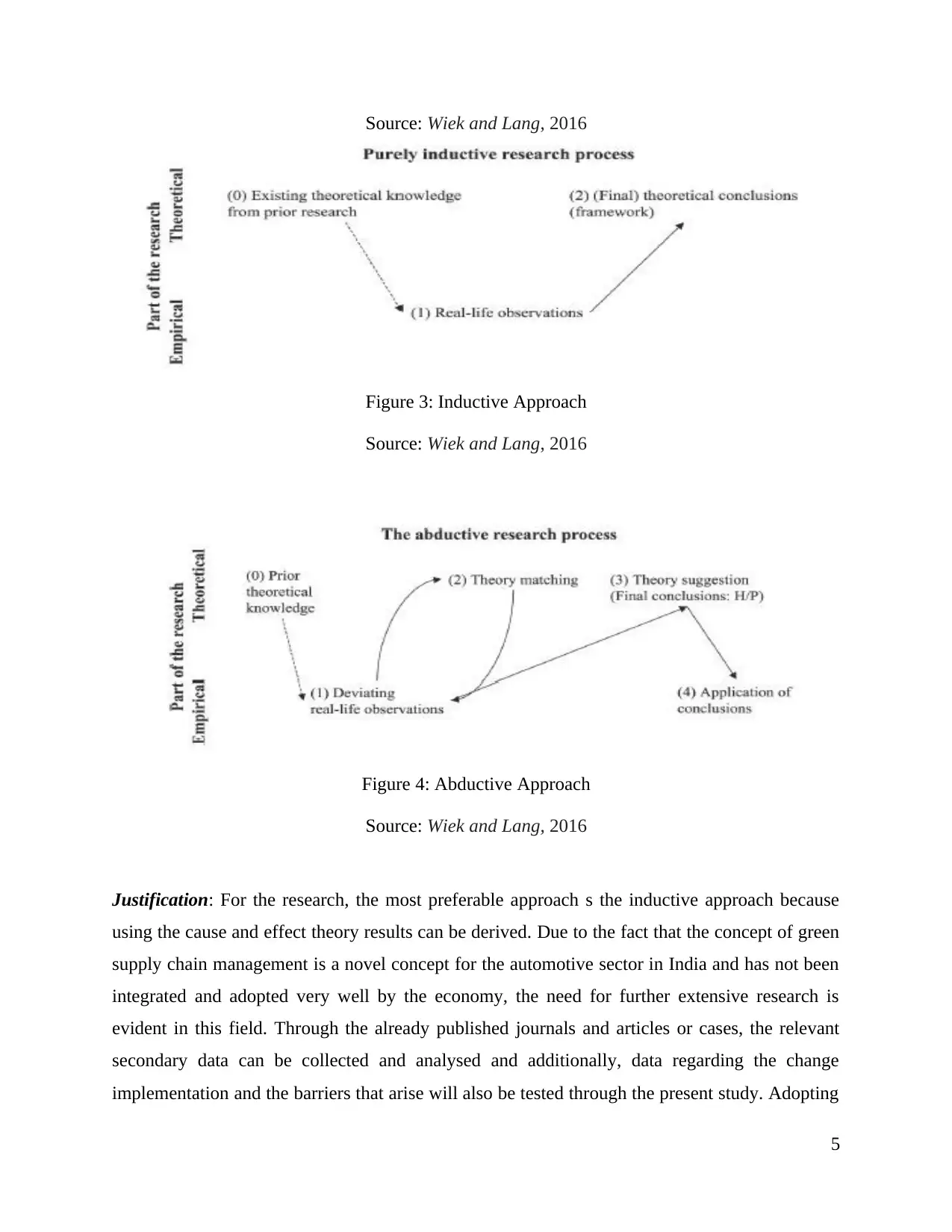
Source: Wiek and Lang, 2016
Figure 3: Inductive Approach
Source: Wiek and Lang, 2016
Figure 4: Abductive Approach
Source: Wiek and Lang, 2016
Justification: For the research, the most preferable approach s the inductive approach because
using the cause and effect theory results can be derived. Due to the fact that the concept of green
supply chain management is a novel concept for the automotive sector in India and has not been
integrated and adopted very well by the economy, the need for further extensive research is
evident in this field. Through the already published journals and articles or cases, the relevant
secondary data can be collected and analysed and additionally, data regarding the change
implementation and the barriers that arise will also be tested through the present study. Adopting
5
Figure 3: Inductive Approach
Source: Wiek and Lang, 2016
Figure 4: Abductive Approach
Source: Wiek and Lang, 2016
Justification: For the research, the most preferable approach s the inductive approach because
using the cause and effect theory results can be derived. Due to the fact that the concept of green
supply chain management is a novel concept for the automotive sector in India and has not been
integrated and adopted very well by the economy, the need for further extensive research is
evident in this field. Through the already published journals and articles or cases, the relevant
secondary data can be collected and analysed and additionally, data regarding the change
implementation and the barriers that arise will also be tested through the present study. Adopting
5
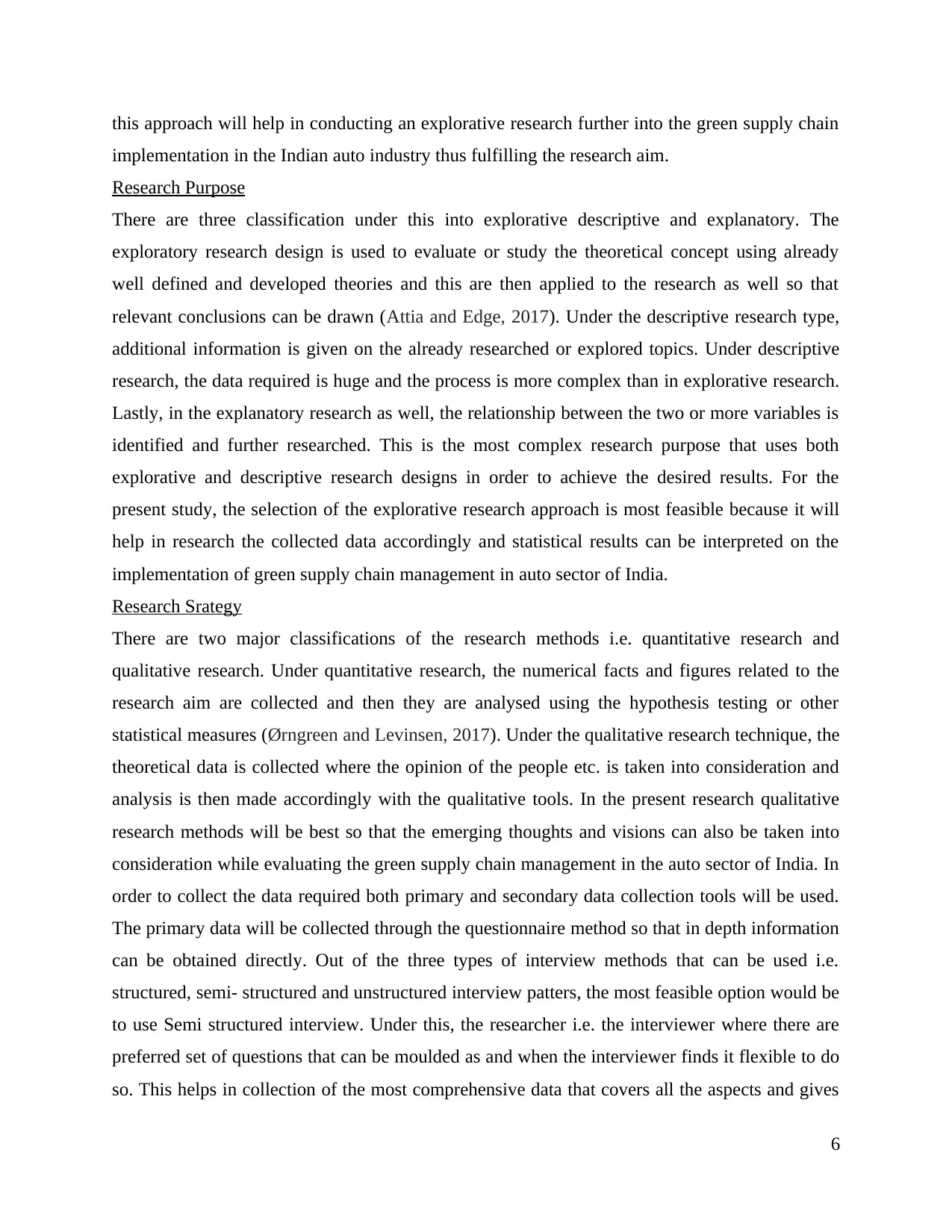
this approach will help in conducting an explorative research further into the green supply chain
implementation in the Indian auto industry thus fulfilling the research aim.
Research Purpose
There are three classification under this into explorative descriptive and explanatory. The
exploratory research design is used to evaluate or study the theoretical concept using already
well defined and developed theories and this are then applied to the research as well so that
relevant conclusions can be drawn (Attia and Edge, 2017). Under the descriptive research type,
additional information is given on the already researched or explored topics. Under descriptive
research, the data required is huge and the process is more complex than in explorative research.
Lastly, in the explanatory research as well, the relationship between the two or more variables is
identified and further researched. This is the most complex research purpose that uses both
explorative and descriptive research designs in order to achieve the desired results. For the
present study, the selection of the explorative research approach is most feasible because it will
help in research the collected data accordingly and statistical results can be interpreted on the
implementation of green supply chain management in auto sector of India.
Research Srategy
There are two major classifications of the research methods i.e. quantitative research and
qualitative research. Under quantitative research, the numerical facts and figures related to the
research aim are collected and then they are analysed using the hypothesis testing or other
statistical measures (Ørngreen and Levinsen, 2017). Under the qualitative research technique, the
theoretical data is collected where the opinion of the people etc. is taken into consideration and
analysis is then made accordingly with the qualitative tools. In the present research qualitative
research methods will be best so that the emerging thoughts and visions can also be taken into
consideration while evaluating the green supply chain management in the auto sector of India. In
order to collect the data required both primary and secondary data collection tools will be used.
The primary data will be collected through the questionnaire method so that in depth information
can be obtained directly. Out of the three types of interview methods that can be used i.e.
structured, semi- structured and unstructured interview patters, the most feasible option would be
to use Semi structured interview. Under this, the researcher i.e. the interviewer where there are
preferred set of questions that can be moulded as and when the interviewer finds it flexible to do
so. This helps in collection of the most comprehensive data that covers all the aspects and gives
6
implementation in the Indian auto industry thus fulfilling the research aim.
Research Purpose
There are three classification under this into explorative descriptive and explanatory. The
exploratory research design is used to evaluate or study the theoretical concept using already
well defined and developed theories and this are then applied to the research as well so that
relevant conclusions can be drawn (Attia and Edge, 2017). Under the descriptive research type,
additional information is given on the already researched or explored topics. Under descriptive
research, the data required is huge and the process is more complex than in explorative research.
Lastly, in the explanatory research as well, the relationship between the two or more variables is
identified and further researched. This is the most complex research purpose that uses both
explorative and descriptive research designs in order to achieve the desired results. For the
present study, the selection of the explorative research approach is most feasible because it will
help in research the collected data accordingly and statistical results can be interpreted on the
implementation of green supply chain management in auto sector of India.
Research Srategy
There are two major classifications of the research methods i.e. quantitative research and
qualitative research. Under quantitative research, the numerical facts and figures related to the
research aim are collected and then they are analysed using the hypothesis testing or other
statistical measures (Ørngreen and Levinsen, 2017). Under the qualitative research technique, the
theoretical data is collected where the opinion of the people etc. is taken into consideration and
analysis is then made accordingly with the qualitative tools. In the present research qualitative
research methods will be best so that the emerging thoughts and visions can also be taken into
consideration while evaluating the green supply chain management in the auto sector of India. In
order to collect the data required both primary and secondary data collection tools will be used.
The primary data will be collected through the questionnaire method so that in depth information
can be obtained directly. Out of the three types of interview methods that can be used i.e.
structured, semi- structured and unstructured interview patters, the most feasible option would be
to use Semi structured interview. Under this, the researcher i.e. the interviewer where there are
preferred set of questions that can be moulded as and when the interviewer finds it flexible to do
so. This helps in collection of the most comprehensive data that covers all the aspects and gives
6
⊘ This is a preview!⊘
Do you want full access?
Subscribe today to unlock all pages.

Trusted by 1+ million students worldwide
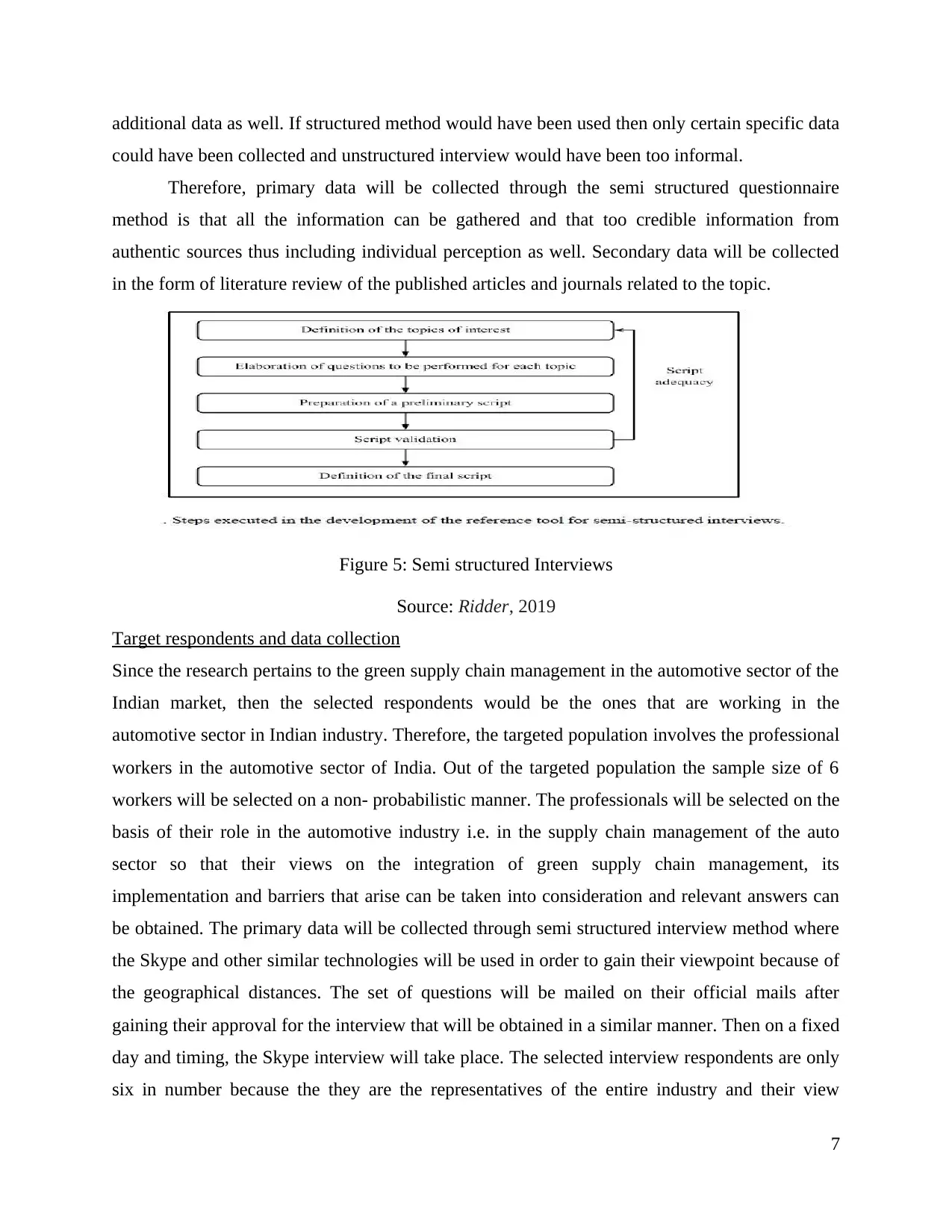
additional data as well. If structured method would have been used then only certain specific data
could have been collected and unstructured interview would have been too informal.
Therefore, primary data will be collected through the semi structured questionnaire
method is that all the information can be gathered and that too credible information from
authentic sources thus including individual perception as well. Secondary data will be collected
in the form of literature review of the published articles and journals related to the topic.
Figure 5: Semi structured Interviews
Source: Ridder, 2019
Target respondents and data collection
Since the research pertains to the green supply chain management in the automotive sector of the
Indian market, then the selected respondents would be the ones that are working in the
automotive sector in Indian industry. Therefore, the targeted population involves the professional
workers in the automotive sector of India. Out of the targeted population the sample size of 6
workers will be selected on a non- probabilistic manner. The professionals will be selected on the
basis of their role in the automotive industry i.e. in the supply chain management of the auto
sector so that their views on the integration of green supply chain management, its
implementation and barriers that arise can be taken into consideration and relevant answers can
be obtained. The primary data will be collected through semi structured interview method where
the Skype and other similar technologies will be used in order to gain their viewpoint because of
the geographical distances. The set of questions will be mailed on their official mails after
gaining their approval for the interview that will be obtained in a similar manner. Then on a fixed
day and timing, the Skype interview will take place. The selected interview respondents are only
six in number because the they are the representatives of the entire industry and their view
7
could have been collected and unstructured interview would have been too informal.
Therefore, primary data will be collected through the semi structured questionnaire
method is that all the information can be gathered and that too credible information from
authentic sources thus including individual perception as well. Secondary data will be collected
in the form of literature review of the published articles and journals related to the topic.
Figure 5: Semi structured Interviews
Source: Ridder, 2019
Target respondents and data collection
Since the research pertains to the green supply chain management in the automotive sector of the
Indian market, then the selected respondents would be the ones that are working in the
automotive sector in Indian industry. Therefore, the targeted population involves the professional
workers in the automotive sector of India. Out of the targeted population the sample size of 6
workers will be selected on a non- probabilistic manner. The professionals will be selected on the
basis of their role in the automotive industry i.e. in the supply chain management of the auto
sector so that their views on the integration of green supply chain management, its
implementation and barriers that arise can be taken into consideration and relevant answers can
be obtained. The primary data will be collected through semi structured interview method where
the Skype and other similar technologies will be used in order to gain their viewpoint because of
the geographical distances. The set of questions will be mailed on their official mails after
gaining their approval for the interview that will be obtained in a similar manner. Then on a fixed
day and timing, the Skype interview will take place. The selected interview respondents are only
six in number because the they are the representatives of the entire industry and their view
7
Paraphrase This Document
Need a fresh take? Get an instant paraphrase of this document with our AI Paraphraser
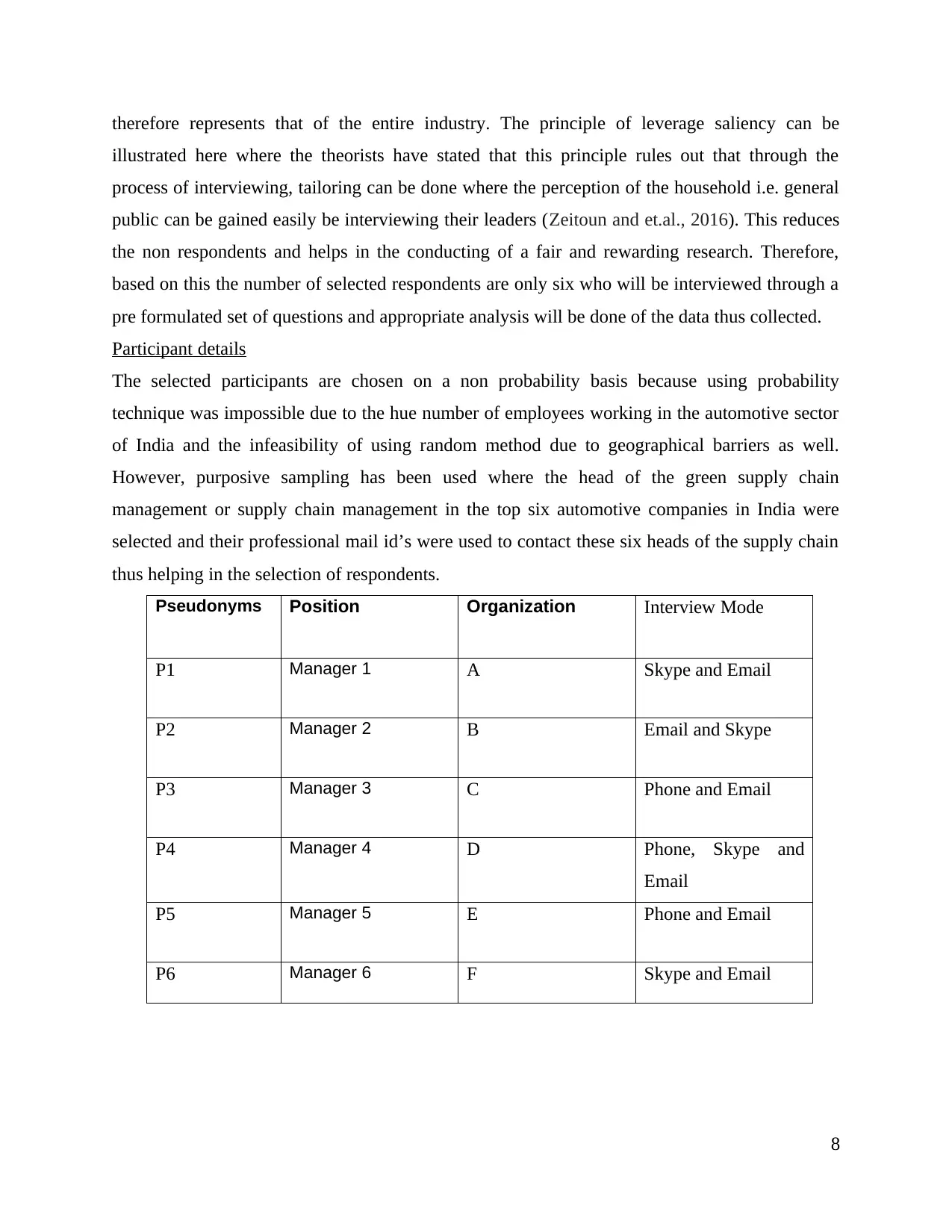
therefore represents that of the entire industry. The principle of leverage saliency can be
illustrated here where the theorists have stated that this principle rules out that through the
process of interviewing, tailoring can be done where the perception of the household i.e. general
public can be gained easily be interviewing their leaders (Zeitoun and et.al., 2016). This reduces
the non respondents and helps in the conducting of a fair and rewarding research. Therefore,
based on this the number of selected respondents are only six who will be interviewed through a
pre formulated set of questions and appropriate analysis will be done of the data thus collected.
Participant details
The selected participants are chosen on a non probability basis because using probability
technique was impossible due to the hue number of employees working in the automotive sector
of India and the infeasibility of using random method due to geographical barriers as well.
However, purposive sampling has been used where the head of the green supply chain
management or supply chain management in the top six automotive companies in India were
selected and their professional mail id’s were used to contact these six heads of the supply chain
thus helping in the selection of respondents.
Pseudonyms Position Organization Interview Mode
P1 Manager 1 A Skype and Email
P2 Manager 2 B Email and Skype
P3 Manager 3 C Phone and Email
P4 Manager 4 D Phone, Skype and
Email
P5 Manager 5 E Phone and Email
P6 Manager 6 F Skype and Email
8
illustrated here where the theorists have stated that this principle rules out that through the
process of interviewing, tailoring can be done where the perception of the household i.e. general
public can be gained easily be interviewing their leaders (Zeitoun and et.al., 2016). This reduces
the non respondents and helps in the conducting of a fair and rewarding research. Therefore,
based on this the number of selected respondents are only six who will be interviewed through a
pre formulated set of questions and appropriate analysis will be done of the data thus collected.
Participant details
The selected participants are chosen on a non probability basis because using probability
technique was impossible due to the hue number of employees working in the automotive sector
of India and the infeasibility of using random method due to geographical barriers as well.
However, purposive sampling has been used where the head of the green supply chain
management or supply chain management in the top six automotive companies in India were
selected and their professional mail id’s were used to contact these six heads of the supply chain
thus helping in the selection of respondents.
Pseudonyms Position Organization Interview Mode
P1 Manager 1 A Skype and Email
P2 Manager 2 B Email and Skype
P3 Manager 3 C Phone and Email
P4 Manager 4 D Phone, Skype and
P5 Manager 5 E Phone and Email
P6 Manager 6 F Skype and Email
8
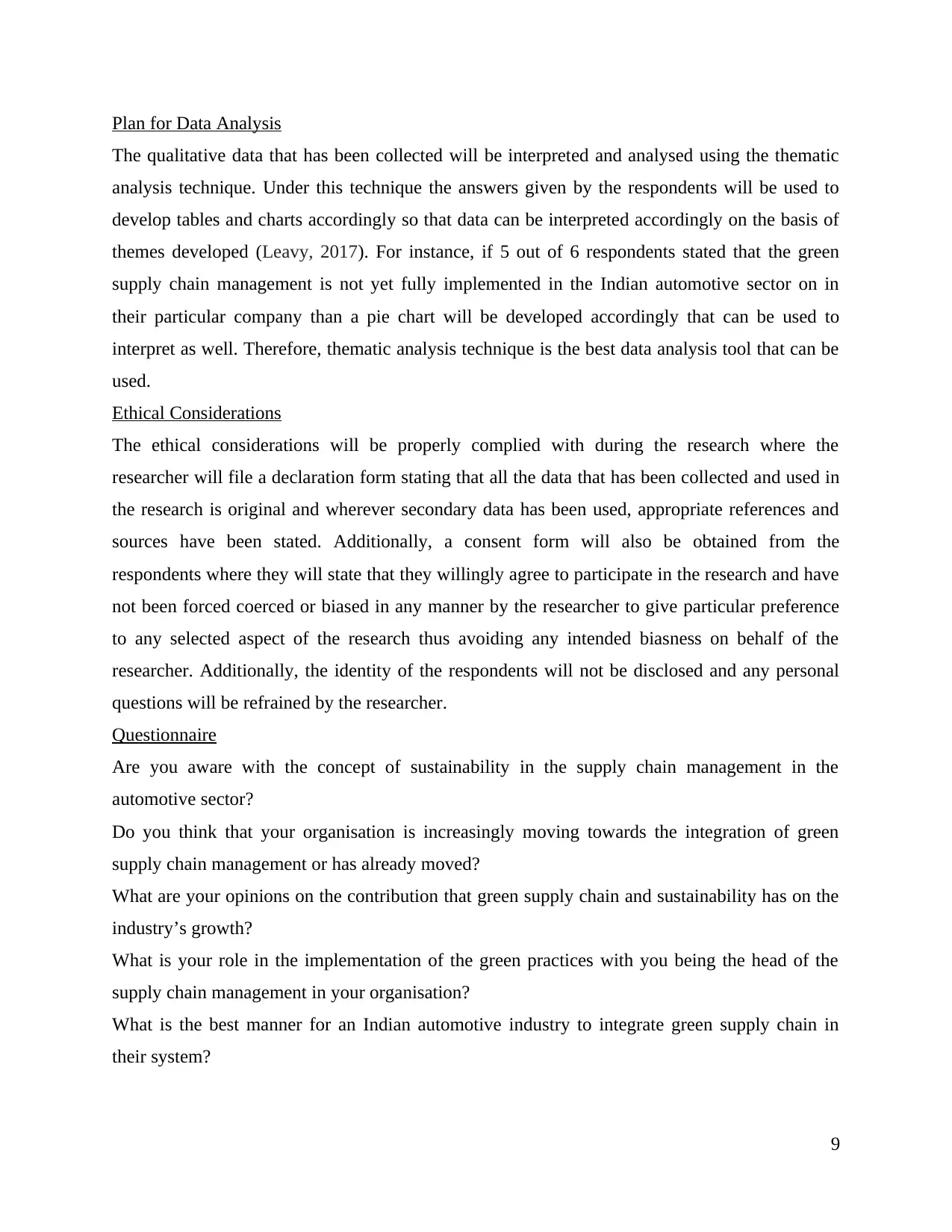
Plan for Data Analysis
The qualitative data that has been collected will be interpreted and analysed using the thematic
analysis technique. Under this technique the answers given by the respondents will be used to
develop tables and charts accordingly so that data can be interpreted accordingly on the basis of
themes developed (Leavy, 2017). For instance, if 5 out of 6 respondents stated that the green
supply chain management is not yet fully implemented in the Indian automotive sector on in
their particular company than a pie chart will be developed accordingly that can be used to
interpret as well. Therefore, thematic analysis technique is the best data analysis tool that can be
used.
Ethical Considerations
The ethical considerations will be properly complied with during the research where the
researcher will file a declaration form stating that all the data that has been collected and used in
the research is original and wherever secondary data has been used, appropriate references and
sources have been stated. Additionally, a consent form will also be obtained from the
respondents where they will state that they willingly agree to participate in the research and have
not been forced coerced or biased in any manner by the researcher to give particular preference
to any selected aspect of the research thus avoiding any intended biasness on behalf of the
researcher. Additionally, the identity of the respondents will not be disclosed and any personal
questions will be refrained by the researcher.
Questionnaire
Are you aware with the concept of sustainability in the supply chain management in the
automotive sector?
Do you think that your organisation is increasingly moving towards the integration of green
supply chain management or has already moved?
What are your opinions on the contribution that green supply chain and sustainability has on the
industry’s growth?
What is your role in the implementation of the green practices with you being the head of the
supply chain management in your organisation?
What is the best manner for an Indian automotive industry to integrate green supply chain in
their system?
9
The qualitative data that has been collected will be interpreted and analysed using the thematic
analysis technique. Under this technique the answers given by the respondents will be used to
develop tables and charts accordingly so that data can be interpreted accordingly on the basis of
themes developed (Leavy, 2017). For instance, if 5 out of 6 respondents stated that the green
supply chain management is not yet fully implemented in the Indian automotive sector on in
their particular company than a pie chart will be developed accordingly that can be used to
interpret as well. Therefore, thematic analysis technique is the best data analysis tool that can be
used.
Ethical Considerations
The ethical considerations will be properly complied with during the research where the
researcher will file a declaration form stating that all the data that has been collected and used in
the research is original and wherever secondary data has been used, appropriate references and
sources have been stated. Additionally, a consent form will also be obtained from the
respondents where they will state that they willingly agree to participate in the research and have
not been forced coerced or biased in any manner by the researcher to give particular preference
to any selected aspect of the research thus avoiding any intended biasness on behalf of the
researcher. Additionally, the identity of the respondents will not be disclosed and any personal
questions will be refrained by the researcher.
Questionnaire
Are you aware with the concept of sustainability in the supply chain management in the
automotive sector?
Do you think that your organisation is increasingly moving towards the integration of green
supply chain management or has already moved?
What are your opinions on the contribution that green supply chain and sustainability has on the
industry’s growth?
What is your role in the implementation of the green practices with you being the head of the
supply chain management in your organisation?
What is the best manner for an Indian automotive industry to integrate green supply chain in
their system?
9
⊘ This is a preview!⊘
Do you want full access?
Subscribe today to unlock all pages.

Trusted by 1+ million students worldwide

What are the potential barriers that can arise according to you in the implementation of the green
supply chain?
Are the partners of your supply chain integrated on the concept of sustainability in the supply
chain or are they having diverse opinion?
Being the head of the supply chain management department, how do you intend to venture your
company towards the sustainability aspect if you have not done this already?
How long do you think Indian automotive industry will take to become fully sustainable in their
supply chain systems?
10
supply chain?
Are the partners of your supply chain integrated on the concept of sustainability in the supply
chain or are they having diverse opinion?
Being the head of the supply chain management department, how do you intend to venture your
company towards the sustainability aspect if you have not done this already?
How long do you think Indian automotive industry will take to become fully sustainable in their
supply chain systems?
10
Paraphrase This Document
Need a fresh take? Get an instant paraphrase of this document with our AI Paraphraser
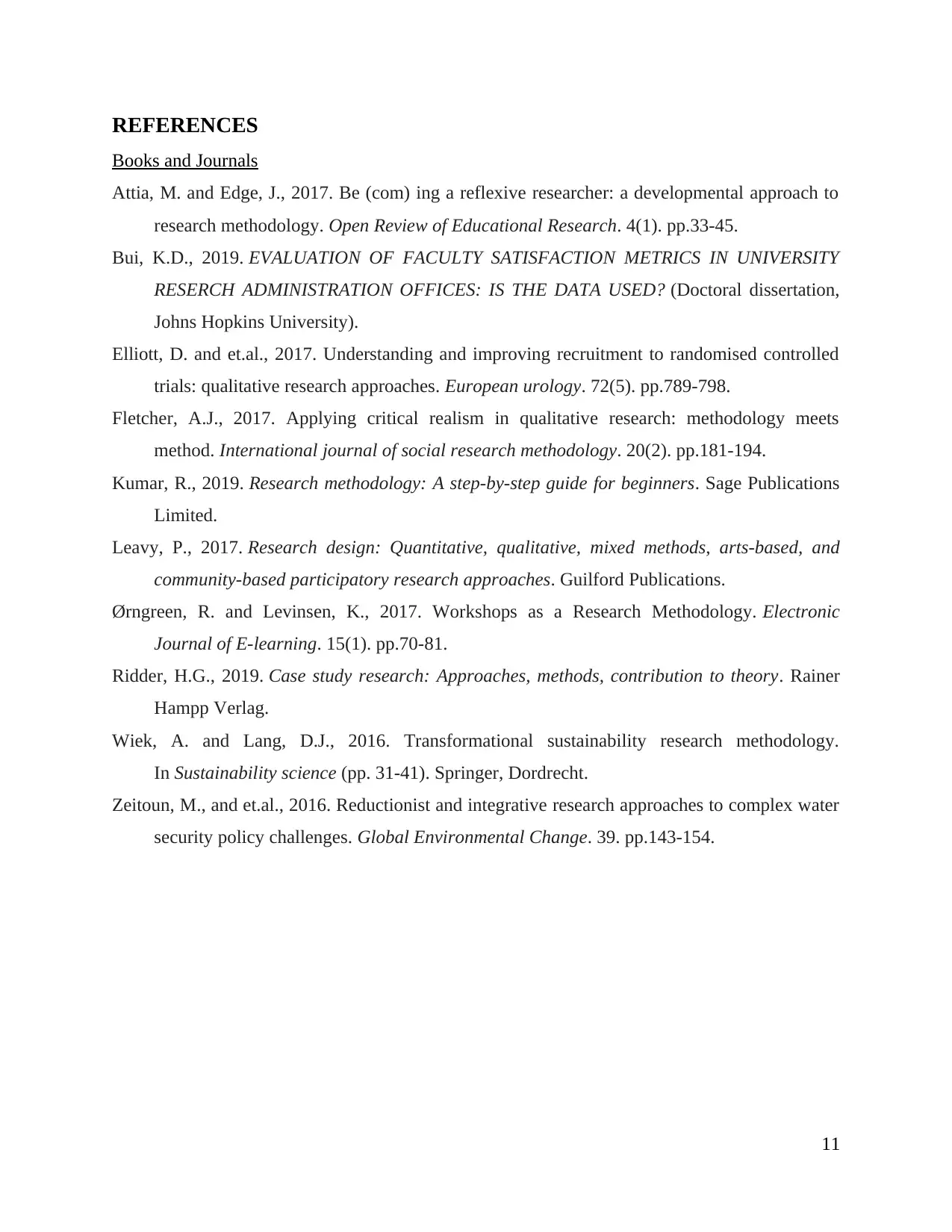
REFERENCES
Books and Journals
Attia, M. and Edge, J., 2017. Be (com) ing a reflexive researcher: a developmental approach to
research methodology. Open Review of Educational Research. 4(1). pp.33-45.
Bui, K.D., 2019. EVALUATION OF FACULTY SATISFACTION METRICS IN UNIVERSITY
RESERCH ADMINISTRATION OFFICES: IS THE DATA USED? (Doctoral dissertation,
Johns Hopkins University).
Elliott, D. and et.al., 2017. Understanding and improving recruitment to randomised controlled
trials: qualitative research approaches. European urology. 72(5). pp.789-798.
Fletcher, A.J., 2017. Applying critical realism in qualitative research: methodology meets
method. International journal of social research methodology. 20(2). pp.181-194.
Kumar, R., 2019. Research methodology: A step-by-step guide for beginners. Sage Publications
Limited.
Leavy, P., 2017. Research design: Quantitative, qualitative, mixed methods, arts-based, and
community-based participatory research approaches. Guilford Publications.
Ørngreen, R. and Levinsen, K., 2017. Workshops as a Research Methodology. Electronic
Journal of E-learning. 15(1). pp.70-81.
Ridder, H.G., 2019. Case study research: Approaches, methods, contribution to theory. Rainer
Hampp Verlag.
Wiek, A. and Lang, D.J., 2016. Transformational sustainability research methodology.
In Sustainability science (pp. 31-41). Springer, Dordrecht.
Zeitoun, M., and et.al., 2016. Reductionist and integrative research approaches to complex water
security policy challenges. Global Environmental Change. 39. pp.143-154.
11
Books and Journals
Attia, M. and Edge, J., 2017. Be (com) ing a reflexive researcher: a developmental approach to
research methodology. Open Review of Educational Research. 4(1). pp.33-45.
Bui, K.D., 2019. EVALUATION OF FACULTY SATISFACTION METRICS IN UNIVERSITY
RESERCH ADMINISTRATION OFFICES: IS THE DATA USED? (Doctoral dissertation,
Johns Hopkins University).
Elliott, D. and et.al., 2017. Understanding and improving recruitment to randomised controlled
trials: qualitative research approaches. European urology. 72(5). pp.789-798.
Fletcher, A.J., 2017. Applying critical realism in qualitative research: methodology meets
method. International journal of social research methodology. 20(2). pp.181-194.
Kumar, R., 2019. Research methodology: A step-by-step guide for beginners. Sage Publications
Limited.
Leavy, P., 2017. Research design: Quantitative, qualitative, mixed methods, arts-based, and
community-based participatory research approaches. Guilford Publications.
Ørngreen, R. and Levinsen, K., 2017. Workshops as a Research Methodology. Electronic
Journal of E-learning. 15(1). pp.70-81.
Ridder, H.G., 2019. Case study research: Approaches, methods, contribution to theory. Rainer
Hampp Verlag.
Wiek, A. and Lang, D.J., 2016. Transformational sustainability research methodology.
In Sustainability science (pp. 31-41). Springer, Dordrecht.
Zeitoun, M., and et.al., 2016. Reductionist and integrative research approaches to complex water
security policy challenges. Global Environmental Change. 39. pp.143-154.
11

12
⊘ This is a preview!⊘
Do you want full access?
Subscribe today to unlock all pages.

Trusted by 1+ million students worldwide
1 out of 12
Related Documents
Your All-in-One AI-Powered Toolkit for Academic Success.
+13062052269
info@desklib.com
Available 24*7 on WhatsApp / Email
![[object Object]](/_next/static/media/star-bottom.7253800d.svg)
Unlock your academic potential
Copyright © 2020–2026 A2Z Services. All Rights Reserved. Developed and managed by ZUCOL.





